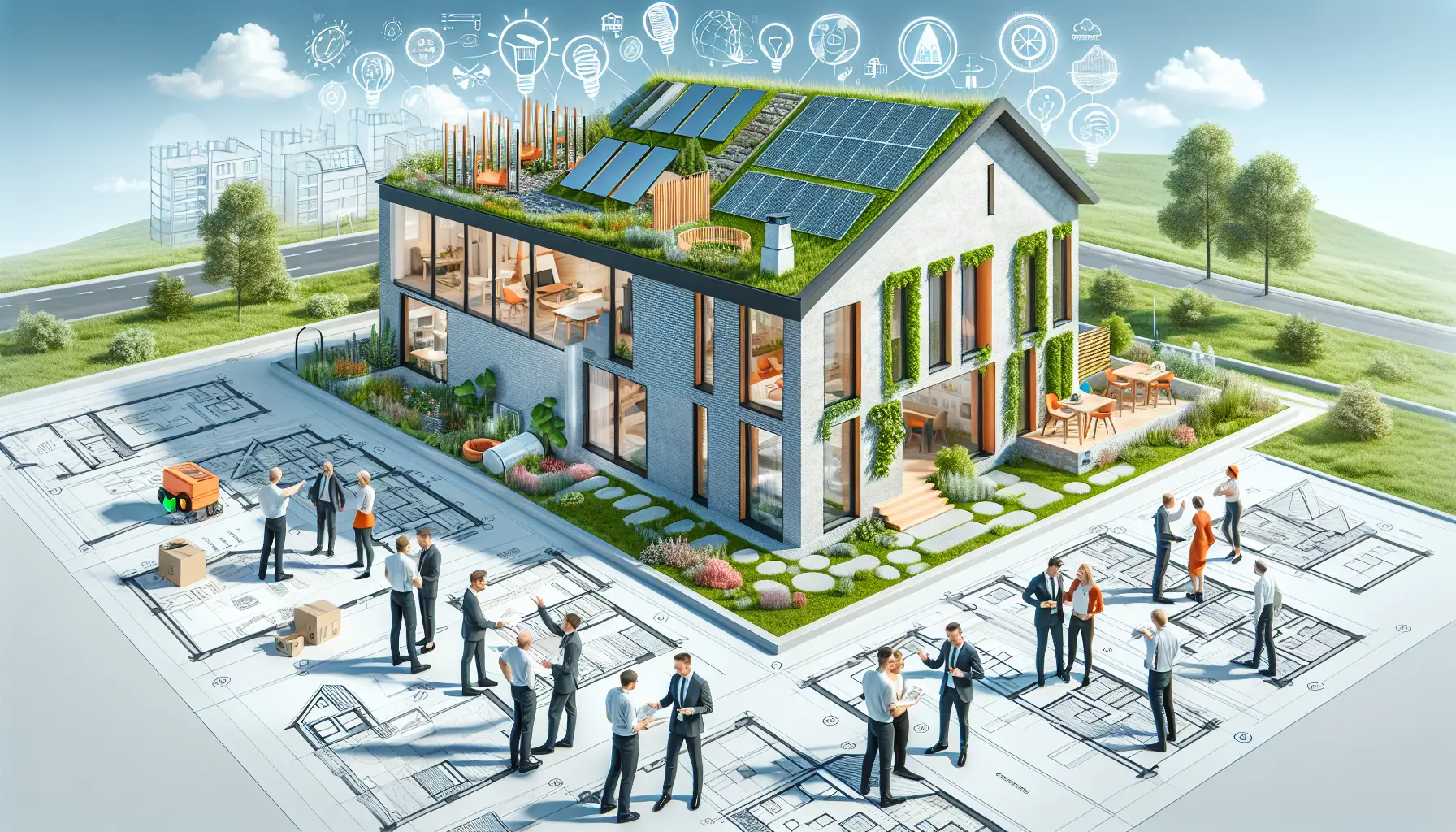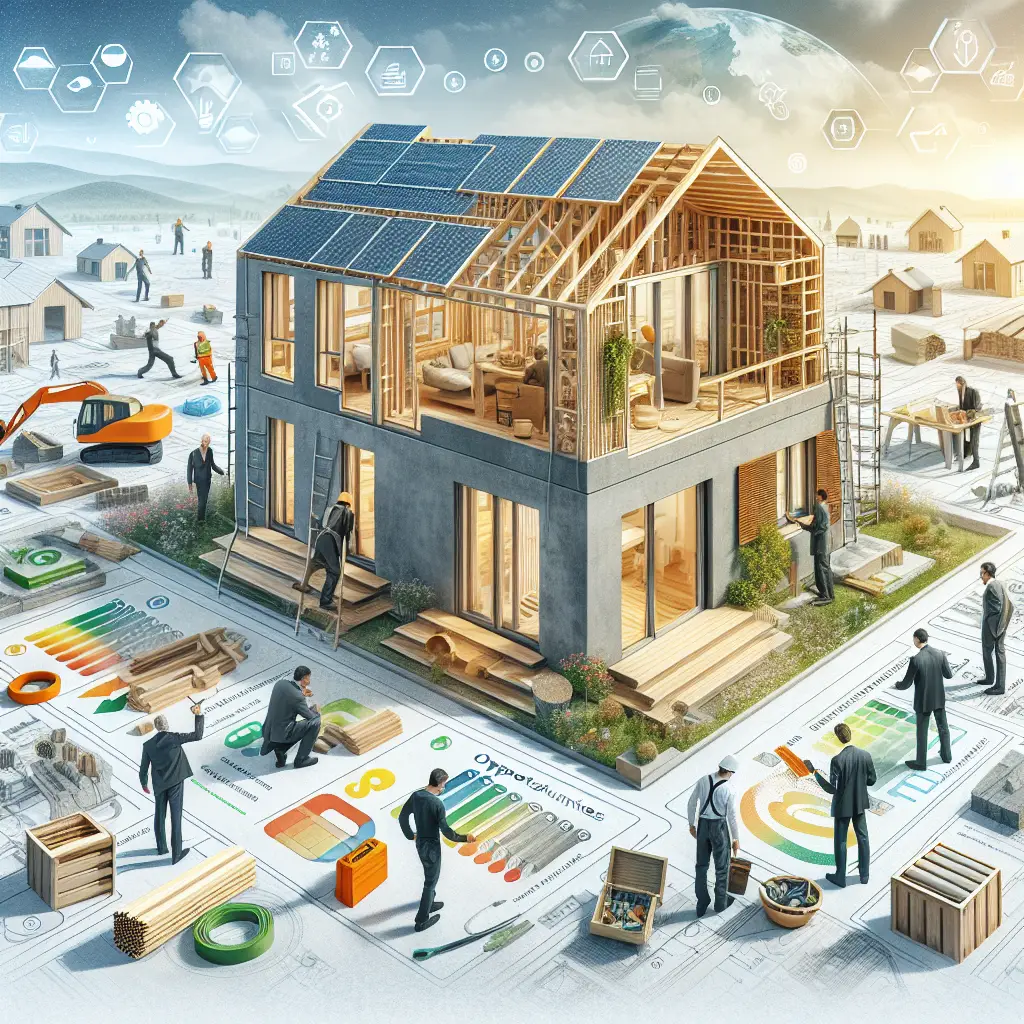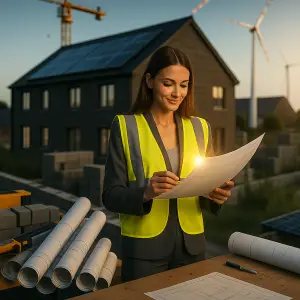Building Regulations for Eco-Homes: Challenges and Opportunities
The push toward eco-friendly homes is gaining momentum as environmental awareness reaches new heights and the imperative to combat climate change becomes increasingly urgent. While the concept of sustainable housing is replete with potential, building eco-homes under current regulations presents a complex landscape filled with both challenges and opportunities for innovation and growth.
Challenges
Regulatory Compliance
Navigating the maze of building regulations is perhaps one of the most daunting challenges in constructing eco-homes. Governments worldwide are imposing new, rigorous environmental standards and building codes to endorse sustainable practices. Failing to adhere to these can not only invite hefty fines and legal repercussions but also tarnish the reputation of construction firms. At Ratio Seven, we understand that staying ahead of these regulations requires continuous monitoring and updating of compliance strategies.
Higher Initial Costs
The initial financial outlay for eco-friendly building materials and energy-efficient technologies remains significantly higher compared to conventional methods. Although these investments typically pay off in reduced energy bills and lower operational costs over time, the steep upfront costs can deter developers and homeowners. Ratio Seven is committed to educating clients on how these costs translate into long-term savings and initiating cost-effective strategies to alleviate the initial financial burden.
Lack of Expertise and Education
A notable barrier to the adoption of sustainable building techniques is the lack of expertise within the industry. This expertise gap can lead to sub-optimal implementation and reduced effectiveness of sustainable features. With technologies and materials like solar roof tiles becoming mainstream, contractors must be open to continuous learning and adaptation. Ratio Seven endeavours to bridge this gap by offering training and resources to empower contractors to work efficiently with unfamiliar materials and technologies.
Material Selection and Availability
Choosing the right sustainable materials is a task fraught with challenges, primarily due to the varying environmental impacts these materials may present. While materials like recycled concrete mixes are generally considered eco-friendly, others such as some paint variants contain volatile organic compounds (VOCs) that can harm the environment. As an additional hurdle, the scarcity of sustainable materials in remote regions often inflates prices and creates logistical headaches. Ratio Seven works tirelessly to source and incorporate the most effective green materials for our projects.
Zoning Laws and Certifications
Zoning laws and certification requirements present formidable obstacles in the eco-home building process. For instance, tiny homes, despite their minimal environmental footprint, often fail to meet the minimum size requirements needed to qualify as official residences. Furthermore, securing certifications such as LEED can often be both costly and enduring. We at Ratio Seven strive to assist our stakeholders in navigating these legal waters with precision and efficiency.
Approval and Inspection Processes
Another layer of complexity emerges in the approval processes for green systems like rainwater recovery and innovative HVAC systems. These processes can be unpredictable and sluggish due to possible clashes with existing regulations, potentially delaying projects and escalating costs. At Ratio Seven, we prioritise not only gaining requisite approvals swiftly but also ensuring consistent dialogue with regulatory bodies to streamline these procedures.
Opportunities
Environmental Conservation
Eco-friendly home building offers an unparalleled opportunity for environmental conservation. By employing sustainable building materials and efficient resource usage, eco-homes substantially reduce resource consumption, minimise waste, and lower energy use. This leads to a tangible reduction in greenhouse gas emissions and a decrease in the overall environmental impact of construction activities. Ratio Seven remains dedicated to advancing these conservation initiatives in every project we undertake.
Health and Well-being
The adoption of eco-friendly construction methods extends beyond environmental benefits to considerably enhancing the health and well-being of residents. Green homes foster improved indoor air quality by using non-toxic materials, state-of-the-art ventilation systems, and low-VOC paints and adhesives. Ratio Seven consistently advocates for healthier living spaces by integrating these features into the homes we build.
Market Demand and Financial Benefits
There is an increasing demand for eco-friendly homes, driven by a growing awareness of environmental issues. Modern homebuyers actively seek properties that boast energy efficiency and sustainability, lured by promises of diminished utility expenses and accumulated long-term savings. This burgeoning demand enhances the reputation of forward-thinking builders and developers. Ratio Seven capitalises on this trend by delivering energy-efficient and sustainable properties that provide financial advantages for buyers and sellers alike.
Innovation and Collaboration
The shift toward sustainable building practices compels innovation and collaboration within the construction industry. Embracing cutting-edge technologies such as Building Information Modelling (BIM) and advanced project management tools can drastically improve processes, boost collaboration, and position companies at the forefront of industry development. At Ratio Seven, we are committed to sharing best practices and lessons learned that will expedite the adoption of sustainable construction methods across the industry.
Looking to the Future
Building eco-friendly homes is a critical step toward a more sustainable future, but it comes with its own set of challenges. Addressing these challenges through continuous education, adaptation to new technologies, and collaboration across the industry is essential. Ratio Seven believes that despite the higher initial costs and regulatory complexities, the long-term benefits of eco-friendly home building, including environmental conservation, improved health and well-being, and financial savings, make it a compelling and necessary direction for the construction industry.

FAQs
What are the primary challenges in building eco-homes?
In building eco-homes, navigating regulatory compliance represents a significant challenge due to evolving government standards aimed at endorsing sustainable practices. Moreover, there are issues related to the high initial costs of eco-friendly materials, the expertise required to use new technologies, material selection complexities, zoning laws obstacles, and approval process delays. Overcoming these involves consistent education, strategic planning and, importantly, selecting a construction partner like Ratio Seven that understands sustainable building intricacies.
How do eco-friendly homes impact homebuyers financially?
Eco-friendly homes carry the promise of reduced utility bills and long-term savings, making them financially attractive to contemporary homebuyers increasingly aware of sustainability’s advantages. Although building such homes involves higher initial costs, these costs are amortised by the economical use of energy and resources, which considerably decreases operational expenses over time. At Ratio Seven, we focus on demonstrating the financial merits of sustainable homes and developing cost-effective strategies that deliver long-term benefits.
What role does innovation play in eco-home building?
Innovation is integral to the eco-home building industry, necessitating the adoption of advanced technologies and collaborative practices. Utilising tools like Building Information Modelling (BIM) and innovative project management systems streamlines processes and enhances the collaborative efforts required to push sustainable building practices forward. We at Ratio Seven are firm advocates of innovation, seeing it as a means not only to refine our practices but also to maintain our standing as leaders in the eco-build domain.
Is reputation important for developers in the eco-home market?
Absolutely. The eco-home market is experiencing a heightened demand driven by the social responsibility and environmental consciousness of today’s homebuyers. Builders who can show their commitment to sustainability through successful eco-home projects can significantly enhance their reputation in the market. At Ratio Seven, we leverage this demand by ensuring our projects meet impeccable sustainability standards, thereby reinforcing our reputation as responsible and forward-thinking developers.
Challenges for the eco-home market
While the eco-home market presents certain challenges—like regulatory compliance hurdles and high initial building costs—addressing them unlocks significant opportunities. By prioritising health, environmental conservation, and continuous innovation, builders can navigate this complex landscape effectively, delivering quality sustainable housing solutions to a market increasingly in demand.
Ratio Seven stands ready to guide and contribute to this transformative journey, fostering an industry increasingly aligned with global sustainability goals.




